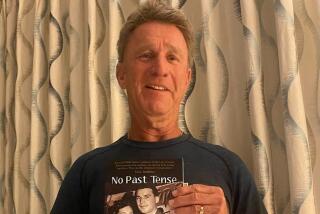Dodgers’ Stan Kasten shaped by his father’s unforgettable lessons
Of all the important numbers rolling around Stan Kasten’s busy brain, from a giant Dodgers payroll to shrinking Dodgers victories to the size of the line at reserved-level bathrooms, the number that most shaped his life is the one he’s never known.
It was tattooed in blue on the left forearm of his father. The number was blurred because, during the five years Nathan Kasten spent in Nazi concentration camps during the Holocaust, he would continually gnaw his skin in an attempt to suck out the ink.
“His memories, my lessons,” Kasten said.
The lessons are especially celebrated by Kasten on Father’s Day, during which he tearfully remembers the father who pushed his son to a brilliant future from an unimaginable past, a father whose tales of life in Auschwitz and Dachau inspired the son to reach for a piece of one of the sports cornerstones of American culture.
“My father’s life taught me you can never forget how incredibly lucky you are to live in a country where you can be whatever you want to be,” Kasten said. “How I live my life is built on that belief.”
The lessons can be seen daily by Dodgers fans as the team’s president and co-owner scurries about Chavez Ravine loudly embracing and engaging and exuding an old-fashioned belief in blue.
You can see it in Kasten’s relentless optimism, learned from a father who was liberated from a death camp shortly before what he believed was his scheduled execution. You can see it in his appreciation and nourishment of the Dodgers family, learned from a father who came to America alone after all 53 living relatives had been killed in those camps.
Perhaps more than anything else, you can see that Stan Kasten is his father’s son when he picks up the trash.
Kasten’s defining memory of his father occurred when Kasten was an adolescent working at his family’s roadside motel and restaurant business in the tiny central New Jersey town of Farmingdale. One afternoon, when Kasten was walking across the parking lot from the motel to the restaurant, a trash can blew over behind him, scattering garbage everywhere. Kasten turned, saw it and just kept walking.
His father, working his daily job as the restaurant chef, witnessed the incident from the restaurant kitchen window. When the son came through the door, the father pounced.
“He looked at me and said, ‘You are the laziest thing I’ve ever seen,’” Kasten recalled. “That never left me. That stuck with me forever. I am fundamentally a lazy person, but I combat it every day when I think about the trash can.”
Sitting in his spotless office above left field at Dodger Stadium, Stan Kasten excused himself to retrieve a tissue. Talking about his father makes him weep. Thinking about his father’s strong stoicism makes him uncomfortable.
“This is not fair. I’m going to choke up over all this stuff, you’re going to write it, and I’m going to be embarrassed,” Kasten said quietly.
In his second season of running the Dodgers, Kasten still loves walking to his window and staring out at the deep green outfield vista and pinching himself. Growing up, the most compelling visuals were those of murdered Jews.
After his father was finally liberated from the camps, he was confronted by a German soldier taunting him with Holocaust photos. His father pummeled the soldier and took the photos, which he brought to America and later pulled out to remind Kasten and Kasten’s sister, Mimi, and brother, Mitch, of their great fortune.
“Piles and piles and piles of photos,” Kasten said. “I grew up with thousands of pictures of dead bodies, a constant message to all of us.”
That his father was among the living taught Kasten about resilience, which he has relied upon throughout his life. He worked his way from Orthodox Jewish schools to an Ivy League law degree to the Atlanta Braves, which he slowly built into champions before building a playoff team in Washington and eventually landing with the Dodgers.
“Not that my father understood any of it,” Kasten said. “He thought, ‘You’ve got this great Ivy League education and you’re going into sports? Why are you throwing it all away?”’
Nathan Kasten, a giant who was not particularly large, had far simpler dreams for his children. He hoped only that they would live the productive American family life he had worked so hard to attain.
His family says one of Nathan’s favorite sayings, in his native Yiddish, was, “A kratz und a mish, und a shtetl aufn tish.”
They translate that roughly as, “A scrape and a mix and put it on the table.” This is not only how he cooked the restaurant meals, but how he built his life.
When Nathan was a 19-year-old in Poland in 1939, he was taken from his home and given a death sentence that he avoided only because of his age and strength. He was moved from camp to camp because he was one of those strong enough to shovel the dead bodies into the ovens or pile them into giant graves.
“The only way he could survive was to make himself useful,” said Kasten’s sister, Mimi Werbler. “It was horrific, but he didn’t have a choice.”
Nathan once told his children of the corpse whose skin had shrunk so much that the body sat up as it was being pushed into an oven, a vision that frightened Nathan for weeks. Nathan also told of the small triumphs. He and friends would return to the open graves late at night, digging through the bodies in hopes of finding someone still alive. One time they found someone, carried him back to the barracks and nursed him back to health.
“The best man I’ve ever met?” Kasten said. “My father was also the best role model I’ve ever met.”
Upon liberation, Nathan Kasten was sent to a displaced persons camp, where he spent two years before finally finding his way to America under circumstances that still leave his son in awe.
“He transported his whole life to a country where he virtually knew nobody, didn’t speak the language and had nothing,” Kasten said. “Could you do that? Could I do that?”
Nathan’s saving grace was Sylvia, whom he met at the displaced persons camp after she had survived a prison camp in Poland by posing as a Christian. They married, saved the money Nathan earned as a tailor and eventually raised a family on a rural chicken farm that they later turned into a hotel-restaurant.
Through his parents, Kasten lived the immigrant experience common to so much of the Dodgers fan base. His first language is Yiddish, which he and wife, Helen, still speak to each other when they want privacy from their four children. He learned tolerance, inclusivity and the importance of the sort of diversity that is prevalent in today’s Dodgers culture.
“Clearly, the lesson to me in my household was the insanity of discrimination,” Kasten said. “It’s a mental illness. It’s a disease.”
Kasten loved baseball, but his father never played catch with him in the backyard. His father never even knew how to play catch. His father never attended any of his youth league baseball games and wouldn’t know the rules if he did.
“My parents didn’t get sports, but they knew Stan loved it, and so they let him do it,” Werbler said. “After all they had been through, they just wanted us to be happy and productive.”
Nathan died from complications of diabetes in 1996 at age 75. Sylvia died in 2009. Neither of them ever quite understood what their oldest son did, yet when Kasten’s long-suffering Atlanta Braves won their only world championship in 1995, his father paid him the ultimate compliment.
The clinching game ended late, and the ailing Nathan was in bed, yet later he was angry nobody woke him up to tell him.
“My father didn’t know big business, and he didn’t know sports,” Kasten said. “But he appreciated what it was like to come from the bottom rung.”
A father’s memories. A son’s lessons.
twitter.com/billplaschke
More to Read
Get our high school sports newsletter
Prep Rally is devoted to the SoCal high school sports experience, bringing you scores, stories and a behind-the-scenes look at what makes prep sports so popular.
You may occasionally receive promotional content from the Los Angeles Times.







